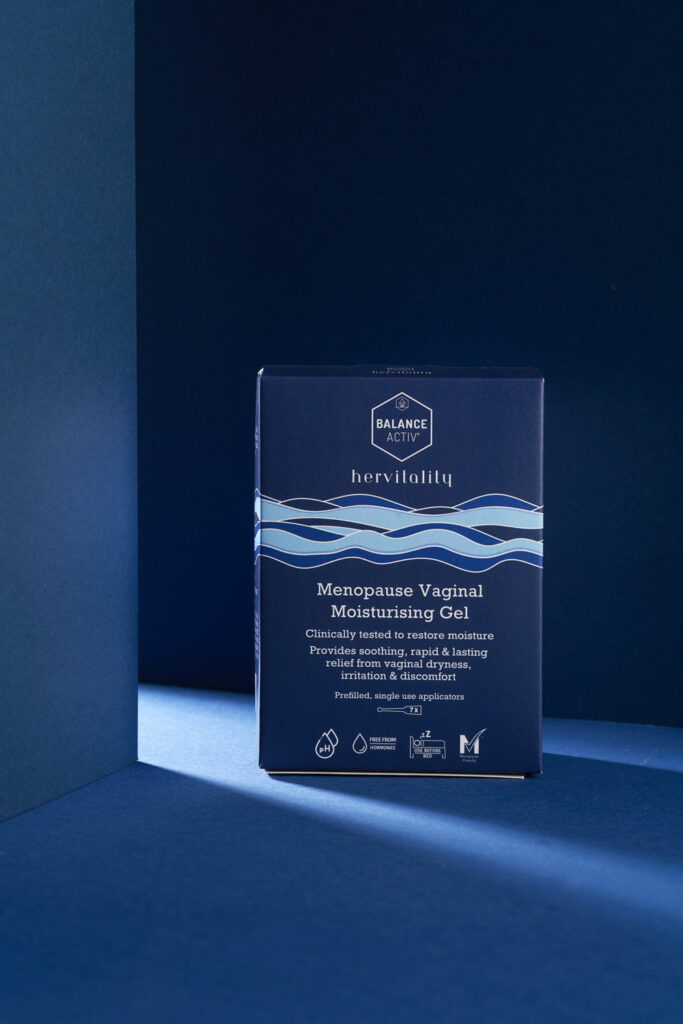Addressing Vaginal Dryness During Perimenopause and Menopause
Did you know that research from Gen M identified there are 48 symptoms of menopause? Most people can only name four symptoms when asked, and many women associate menopause with hot flushes and night sweats.
However, a lesser-discussed symptom is vaginal dryness. Vaginal dryness affects over half of post-menopausal women and around 15% of peri-menopausal women. This can be a real source of discomfort, affecting intimacy and overall well-being. Let’s talk about vaginal dryness, why it happens and what you can do to find relief.
What Causes Vaginal Dryness?
Vaginal dryness occurs when the vaginal tissues thin and lose elasticity due to a decline in estrogen production during perimenopause or menopause. Oestrogen plays a vital role in keeping the vaginal lining healthy and lubricated. As Oestrogen levels drop, the vagina becomes drier, thinner, and more prone to irritation, leading to a range of uncomfortable symptoms.
Symptoms and Impact of Vaginal Dryness on Daily Life
You may think that vaginal dryness is just that, a symptom of dryness, but it can cause several problems. These symptoms can range from mild irritation to causing significant discomfort and impacting daily activities. Here’s a closer look:
Discomfort and Irritation
Vaginal dryness often presents as a feeling of dryness, soreness, and itching in and around the vagina. This can make everyday activities like wearing tight clothing or exercising uncomfortable.
Painful Intercourse
Due to the lack of natural lubrication, sexual intercourse can become painful or even impossible. This can negatively impact intimacy and emotional well-being in relationships.
Burning with Urination
No, you don’t necessarily have an infection because it burns when you pee. The thinning of vaginal tissues can also irritate the urethra, leading to a burning sensation when passing urine. This discomfort can increase urinary urgency and frequency.
Increased Risk of Infections
But it does put you at risk of more infections. A healthy vagina maintains a natural balance of good bacteria. This balance can be disrupted with dryness, making women more susceptible to recurrent yeast infections and urinary tract infections (UTIs).
Impact on Mental Wellbeing
The physical discomfort and potential disruption to intimacy caused by vaginal dryness can take a toll on mental well-being. You may experience decreased self-esteem, anxiety, and even depression.
While it’s a common symptom of perimenopause/menopause, vaginal dryness shouldn’t be considered a normal part of ageing. If you’re experiencing discomfort, there are effective treatment options available to help you regain your well-being and intimacy
Treatment Options for Vaginal Dryness
No ‘one size fits all’ when it comes to treating vaginal dryness. There are several treatment options to consider, such as:
Over-the-counter (OTC) moisturisers and lubricants
These are readily available at most pharmacies, grocery stores, and online:
- Moisturisers: Formulated specifically for the vaginal area, they provide long-lasting hydration and help restore suppleness to the tissues. Look for water-based options that are free of fragrance and harsh chemicals.
- Lubricants: Designed for immediate relief during sexual activity, lubricants provide a slippery texture to reduce friction and discomfort. Water-based lubricants are generally preferred as they are gentle and long-lasting.
At Balance Activ, we understand that the needs of your vaginal health can change throughout different stages of menopause. Our products are specifically designed to address these changes, including the natural shift in vaginal pH that often occurs. Whether you prefer the ease of a gel or the benefits of a pessary, Balance Activ has an option to treat your vaginal dryness and help you feel comfortable and confident again.

Prescription medications
For more persistent dryness, your doctor may recommend prescription options:
- Oestrogen therapy: This can come in various forms like creams, tablets, or rings inserted directly into the vagina. By replacing lost Oestrogen, it helps thicken and revitalise the vaginal tissues, improving lubrication and reducing discomfort.
- Ospemifene (Senshio): This is a non-estrogen medication that acts similarly to estrogen in the vagina, alleviating dryness and pain during sex.
Laser therapy
A newer option, laser therapy, involves a series of in-office treatments that stimulate collagen production in the vaginal tissues. This can improve blood flow and elasticity, leading to increased lubrication and tissue strength. Scientists studied this treatment in a trial to see if it could help with vaginal dryness and pain during sex that some women experience during menopause. The National Institute for Health and Care Excellence (NICE) says this treatment should only be used in research settings for now. However, some clinics offer this treatment privately.
It’s important to discuss these options with your doctor to determine the most appropriate course of treatment for you. They can also address any concerns you may have about the risks and benefits of each approach.
Talking to Your Doctor
Talking to your doctor about vaginal dryness might feel uncomfortable, but it’s important to remember they are there to help. Here are four top tips:
- Be prepared: Briefly jot down your symptoms and how long they’ve lasted.
- Start the conversation: Simply say you’re experiencing vaginal dryness and would like to discuss treatment options.
- Be open and honest: Don’t hesitate to share any concerns you have about intimacy or daily activities.
- Ask questions: The more you understand about vaginal dryness and treatment options, the better equipped you’ll be to make informed decisions about your health.
Remember, vaginal dryness is a common issue, and your doctor is there to support you in finding relief.